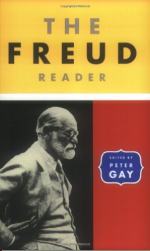
|
| Name: _________________________ | Period: ___________________ |
This test consists of 5 multiple choice questions, 5 short answer questions, and 10 short essay questions.
Multiple Choice Questions
1. What is a specific difficulty of Freud's research?
(a) The interference of his drug use.
(b) The illnesses of 'Dora'.
(c) He was blind.
(d) The intangibility of the subject matter.
2. What is the norm for translated texts?
(a) For the translator to be referred to.
(b) For the author to translate it him or herself.
(c) For the translator to travel to the foreign country to learn colloquial terms.
(d) For the publishing company to hire a translator to work with the author.
3. What affects the way dream ideas are interpreted?
(a) What REM cycle we are in when analyzing.
(b) The amount of time we sleep.
(c) Our daily schedule.
(d) The goals of understanding the dream.
4. What specific knowledge troubles 'Dora' ?
(a) Seeing her mother die.
(b) That her mother is homosexual.
(c) Her mother's extramarital affairs.
(d) Her father's extramarital affairs.
5. What term does Freud give that describes people who confuse their fantasies for facts?
(a) Reality principle.
(b) Sexual principle.
(c) Hallucination principle.
(d) Pleasure principle.
Short Answer Questions
1. What does Freud reiterate is the first rule of psycho-analysis?
2. Which is not a section to the introductory material?
3. What did the nicknamed patient repeatedly suffer from in "Character and Anal Eroticism"?
4. What does "The Sexual Aberrations" section address?
5. What has likely happened to the translations of Freud's work?
Short Essay Questions
1. What does Freud say is the main concern of people's dreams dealing with psycho-therapy?
2. What was Charcot able to decipher in both men and women?
3. What does Freud say neuroses are linked to?
4. In what language was Freud's original work written and how might this affect Freud's work?
5. What are social withdrawals and irritability associated with according to Freud?
6. What did the doctor's find was making 'Dora' verge on suicidal behavior?
7. What are the three sexual preferences Freud discusses in great length and briefly describe them.
8. What is "Wild" Psycho-Analysis?
9. What does Freud suggest about children under five years old?
10. What are some of the conditions to having an effective psycho-analysis?
|
This section contains 726 words (approx. 3 pages at 300 words per page) |

|




